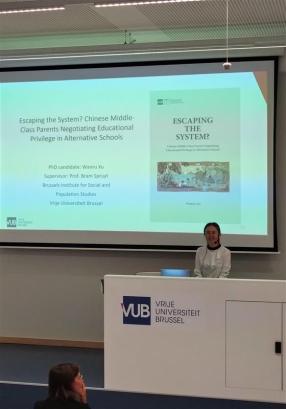
Last Friday, on Semptember 5, 2025, Wanru Xu defended her PhD thesis "Escaping the System? Chinese Middle-Class Parents Negotiating Educational Privilege in Alternative Schools". The thesis was supervised by Prof. Bram Spruyt. The abstract of Wanru's work is available below, as well as publications related to her PhD.
This dissertation investigates the phenomenon of Chinese middle-class families opting for Innovative schools in Dali, a scenic tourist city in southwest China that has emerged as both a destination for lifestyle migration and a hub for alternative education. These Innovative schools emphasize naturalistic, individualized, and child-centered learning, standing in stark contrast to the academically intense, exam-oriented mainstream Chinese education system. Given the ambiguous legal status of these schools and the uncertain academic trajectories of their graduates, choosing Innovative schools offers questionable academic benefits and may even jeopardize children’s future educational prospects. This paradox challenges the widely held assumption in social reproduction theory that middle-class families are highly dependent on conventional academic success and credentialism to transmit social advantage to their children. In light of this, the dissertation addresses the overarching research question: Why do Chinese middle-class parents choose Innovative schools in Dali despite the potential educational and legal risks? Theoretically, the study engages with debates in social reproduction theory, particularly as applied to alternative education in the Chinese context. Drawing on a multi-method research design—including in-depth interviews, on-site observations, and document analysis—the dissertation adopts a multi-layered analytical framework. Chapter 2 contextualizes the emergence and characteristics of alternative education in China, providing the broader backdrop for the development of Innovative schools. Chapter 3 examines parents’ school choice narratives and identifies three dominant rationales: the “investor” (seeking supplemental benefits), the “escapee” (fleeing mainstream pressures), and the “idealist” (pursuing educational values). Chapter 4 shifts the focus to the time strategies adopted by middle-class parents in Innovative schools, revealing how they embrace a “slowingdown” approach and reframe time as a pedagogical resource. Chapter 5 explores how families navigate uncertainty, reframing educational risks as manageable—and even meaningful—thanks to their cultural and economic capital. Across these four chapters, the findings highlight how middle-class parents in Dali actively mobilize symbolic, social, and economic resources to present their decisions as both morally responsible and educationally beneficial. The analysis reveals how middle-class privilege in the educational field is embodied in their capacity to negotiate spatial and temporal distance from dominant educational scripts. Although these families pursue non-mainstream educational paths, they retain significant agency in shaping their children’s development and mitigating potential risks. In doing so, they transform uncertainty into a manageable condition and maintain their moral identity as “good parents” within the context of China’s hyper-competitive education system. Overall, this dissertation offers new insights into the intersection of class, educational choice, and moral agency in contemporary China. It demonstrates how alternative education, far from being a space of resistance or rupture, can function as a privileged terrain where class advantage is reproduced in culturally nuanced ways.
Xu, W., & Spruyt, B. (2025). Navigating a precarious environment? Chinese middle-class parents’ choice for alternative education and the negotiation of their parental identity. International Studies in Sociology of Education, 1-20. DOI: 10.1080/09620214.2025.2485465
Xu, W., & Spruyt, B. (2025). ‘Taking it slower’: how Chinese middle-class parents negotiate a new time perspective in alternative education. British Journal of Sociology of Education, 46(4), 546-561. DOI: 10.1080/01425692.2025.2482076
Xu, W., & Spruyt, B. (2024). Negotiating for distance: the Chinese middle-class seeking alternative education in the idyll. Educational Review, 76(5), 1344-1362. DOI: 10.1080/00131911.2023.2254517
Xu, W., & Spruyt, B. (2022). ‘The road less travelled’: towards a typology of alternative education in China. Comparative Education, 58(4), 434-450. DOI: 10.1080/03050068.2022.2108615
